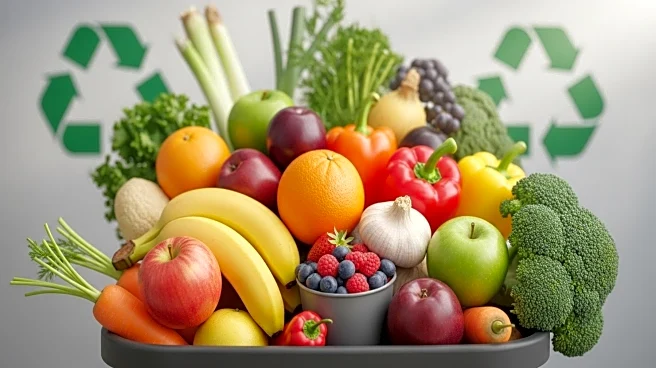What is the story about?
What's Happening?
Wrap Cymru, a recycling charity, has reported that families in Wales are discarding approximately £90 worth of food each month, with food waste constituting a quarter of the rubbish incorrectly placed in black bags. The charity's findings indicate that 80% of this food waste could have been consumed. The Welsh government aims to transform Wales into a 'zero waste nation' by 2050, with a 100% recycling, composting, or preparation for re-use rate across all sectors. Despite Wales having the second-highest recycling rate globally, progress has slowed, with some councils struggling to meet the 70% recycling target by 2025. The government has advised councils to limit general waste collection to once every three or four weeks to encourage recycling.
Why It's Important?
The issue of food waste in Wales underscores the broader challenge of achieving sustainable waste management practices. With food waste being a significant component of household rubbish, addressing this issue is crucial for environmental sustainability and resource efficiency. The Welsh government's ambitious recycling targets reflect a commitment to reducing landfill use and promoting renewable energy generation through waste. Successfully diverting food waste from landfills can enhance Wales' position as a leader in recycling, potentially influencing waste management policies in other regions. The economic implications are also significant, as reducing waste can lower disposal costs and create opportunities for energy production.
What's Next?
To achieve its zero waste goals, the Welsh government and local councils may need to implement more stringent waste management policies and increase public awareness campaigns. Encouraging households to separate waste more effectively and utilize recycling facilities can be pivotal. Additionally, expanding initiatives like the collection of soft plastics and promoting the use of reusable materials could further enhance recycling rates. Stakeholders, including local authorities and environmental organizations, are likely to continue exploring innovative solutions to improve waste management practices and meet government targets.
Beyond the Headlines
The push towards zero waste in Wales highlights the ethical and cultural dimensions of waste management. It reflects a growing societal awareness of environmental responsibility and the need for sustainable living practices. The success of these initiatives could inspire similar efforts globally, contributing to a cultural shift towards more conscientious consumption and waste disposal habits.

















